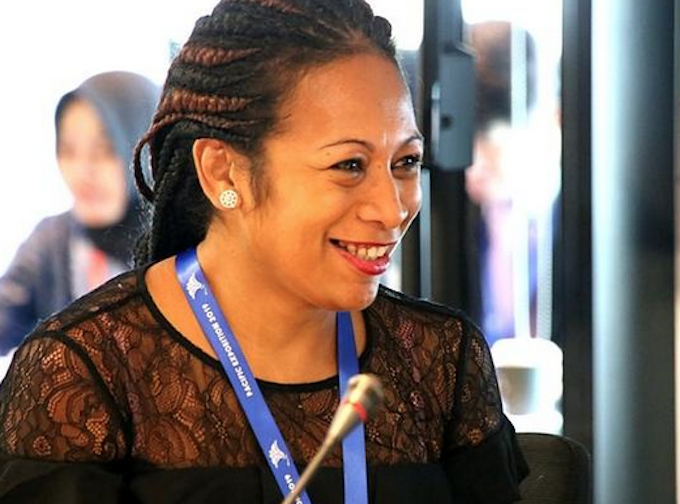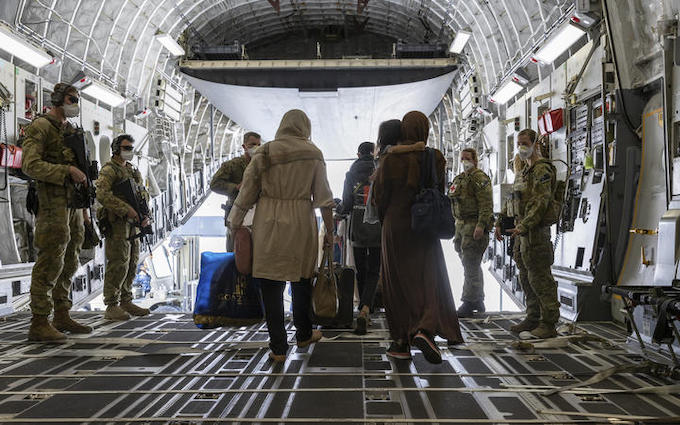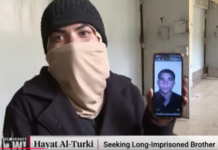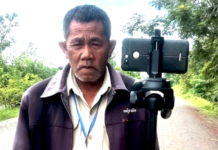
By Christine Rovoi, RNZ Pacific journalist
An International Criminal Court official in the Pacific is calling on all parties in the Afghanistan conflict to respect humanitarian law.
Thousands of foreign nationals, including Afghanis who worked for international agencies, are fleeing the conflict as Taliban forces seized control of the country.
Suicide bombers struck the crowded gates of Kabul airport with at least two explosions on Thursday, causing a bloodbath among civilians, shutting down the Western airlift of Afghans desperate to flee the Taliban regime.
The death toll from the attack is at least 175, including 13 US soldiers, according to media reports.
The attacks came amid ongoing chaos around the airport amid the American withdrawal after 20 years in the region.
Fijian lawyer Ana Tuiketei-Bolabiu has reiterated the Hague Court’s call for all parties to the hostilities to fully respect their obligations under international humanitarian law, including by ensuring the protection of civilians.
She said the ICC may exercise jurisdiction over any genocide, crime against humanity or war crime committed in Afghanistan since the country joined the court in 2003.
First woman counsel
Tuiketei-Bolabiu became the first woman counsel appointed to the Hague Court in April last year. In September, she was elected to the Defence and Membership Committee of the ICC’s Bar Association.
She told RNZ Pacific she is concerned about reports of revenge killings and persecution of women and girls in Afghanistan.
“It’s just an evolving and deteriorating situation in Afghanistan,” she said.
“The UN Security met in New York to discuss the situation in Afghanistan and what was interesting to hear from the Afghani UN ambassador Ghulam Isaczai confirming his concerns on human rights violations for girls, women and human rights defenders, and journalists, including the internally displaced people.
“He also elaborated on the fear of the Kabul residents from the house-to-house search carried out by the Taliban, registering of names and the hunt for people.
“The UN meeting also discussed safety, security, dignity and peace but also trying to protect the lives and the movement of women and children, the international community, displaced people and even the food and all the other humanitarian care that is supposed to be given to the people there.
“We’re hoping that the international human rights laws will actually be observed.”
UN chief Antonio Guterres has also called for an end to the fighting in Afghanistan.
Challenges for prosecutor
Tuiketei-Bolabiu said challenges lay ahead for the Hague Court’s new prosecutor, Karim Khan, who replaced Fatou Bensouda in June this year.
Khan inherits the long-running investigation by his predecessor into possible crimes committed in Afghanistan since 2003.
Those included alleged killings of civilians by the Taliban, as well as the alleged torture of prisoners by Afghan authorities, and by American forces and the CIA in 2003-2004.
Tuiketei-Bolabiu said the ICC only approved a formal investigation in March 2020, which prompted then US President Donald Trump to impose sanctions on Bensouda.
“In May, Afghanistan pleaded with Bensouda for a deferral of the ICC prosecution investigation, arguing that the government was already conducting its own inquiries, mostly focusing on alleged Taliban crimes,” she said.
“Under ICC rules, the court only has power to prosecute crimes committed on the territory of member states when they are unwilling or unable to do so themselves.”
It is not yet clear how the ICC will proceed with the current investigation.

Interests of justice
But Tuiketei-Bolabiu is adamant justice will prevail.
“In March last year, the ICC appeals chamber judges found that in the interest of justice investigations should proceed by the prosecution on war crimes since 2003 including armed conflicts and other serious crimes that fall within the jurisdiction of the courts and that includes the Taliban, Afghan national police, other security forces and the CIA,” she said.
“What’s interesting now is the ICC does not have a police force so it solely relies on member states for arrests and investigations. Now the political landscape in Afghanistan has extremely changed.
“The cooperation with the ICC prosecutions office to support the court’s independence will become a bigger challenge in the future.”
UN Human Rights Council meets
The UN Human Rights Council held a special session this week to address the serious human rights concerns and the situatiation in Afghanistan.
The meeting was called by the council’s Afghanistan and Pakistan members.
Discussions were centred on the appointment of a committee to investigate crimes against humanity.
Tuiketei-Bolabiu said any evidence from the human rights council would help the court’s investigations.
But Amnesty International said the UN council has failed the people of Afghanistan.
In a statement, Amnesty said the meeting neglected to establish an independent mechanism to monitor ongoing crimes under international law and human rights violations and abuses in Afghanistan.
“Such a mechanism would allow for monitoring and reporting on human rights violations and abuses, including grave crimes under international law, and to assist in holding those suspected of criminal responsibility to justice in fair trials.”
However, the calls were ignored by UNHRC member states, who adopted by consensus a weak resolution which merely requests further reports and an update by the UN High Commissioner for Human Rights in March 2022, which adds little to the oversight process already in place.
“The UN Human Rights Council special session has failed to deliver a credible response to the escalating human rights crisis in Afghanistan. Member states have ignored clear and consistent calls by civil society and UN actors for a robust monitoring mechanism,” said Agnès Callamard, Amnesty International’s secretary-general.
“Many people in Afghanistan are already at grave risk of reprisal attacks. The international community must not betray them, and must urgently increase efforts to ensure the safe evacuation of those wishing to leave,” she said.
Amnesty International said member states must now move beyond handwringing, and take meaningful action to protect those feeling the conflict in Afghanistan.
This article is republished under a community partnership agreement with RNZ.











































